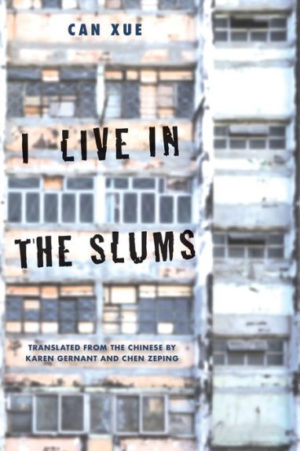I Live in the Slums
by Can Xue, translated by Karen Gernant and Chen Zeping
reviewed by Victoria Zhuang
Chinese experimental author Can Xue is like the Lady Gaga of modern Chinese literature. Both are enthroned sphinxes of world culture today. Xue has been reviled by some critics in her homeland, yet celebrated by others there and elsewhere—especially in the West, to the point that she has become a global phenomenon and a recent Nobel Prize contender. Her work is often outlandish and macabre, eschewing narrative conventions of linearity; it can be comical, but also somber. Like Gaga, she enjoys inhabiting liminality and draws attention to her artist-self as a constructed public identity, using a stage name—her real name is Deng Xiaohua—and referring to herself in the third person during interviews. Her latest short fiction collection, I Live in the Slums, translated into English by Karen Gernant and Chen Zeping, fully lives up to that colorful reputation.
Despite the mention of “slums” in the title, the book rather more accurately evokes a resounding sense of homelessness, statelessness, and disembodiment from all fixed forms of human existence. Xue’s characters, whose stories play out upon various unnamed Chinese urban and rural backgrounds, are tramps and vagabonds, migrants or transients—some human, some not. At times, they take on magical qualities. Animals recount the violent encounters they’ve had while coexisting with human neighbors; a young man sprouts a tail to fit into his new community of shadowfolk; a mysterious supernatural queen, perhaps the clearest emissary of Can Xue herself, flies, teleports, and endlessly morphs.
These beings seek belonging, but there is no world that any of them entirely fits into. “Destiny drove me from one place to another,” one of them says. “I used to have a homeland, but I couldn’t go back to my homeland. It was useless to yearn for her.” They move in an anonymous landscape filled with indistinct and capricious strangers, acquaintances, or family relations, who are often harsh and exclusionary to these itinerants. They long for a past when life was more certain and communities more recognizable. Like their creator Can Xue, a nom de plume which means “residual dirty snow” in Mandarin, they are leftovers. They are the survivors of our collective human fabric, after modernization tore it apart.
Zooming out, this patchwork of shifting, flickering selves suggests an oblique vision of China itself. Though Xue says her writing is not meant to be political, her fiction is steeped in the imagery, lore, and cultural forces of modern China. The loneliness of older Chinese generations is sympathetically documented here with elders who feel respected, yet isolated or misunderstood, such as the titular characters of “The Old Cicada” and “I Am A Willow Tree,” or the aging Woman Wang in “Catfish Pit.” Xue also appears to criticize the excessive urban development of the 80s and 90s that some now say has gone too far, bulldozing once tight-knit neighborhoods and raising poverty rates. This comes out most in the novella, “Story of the Slums,” that opens the book. It features a tormented rat-like individual suffering abuse from humans and animals as he flees from house to house in the urban lowlands. “Rich and poor live in different worlds,” the rat-being laments, quoting an old saying as he reflects on the dire class inequalities of the city he roams.
On the other hand, these stories also have an elusive quality that could easily locate them elsewhere in the universe. They are suffused with a fog that obfuscates time and place, and at times dissolves the boundaries of selfhood, nationality, and other social constructions. To that effect, the scholar John Rothfork has pointed out that Xue’s critics overlook the apparent influence of Daoism on her work. I Live in the Slums certainly brings to mind that famous moment in the writings of the Daoist philosopher Zhuangzi, when he questions the difference between dreams and reality: “I don’t know whether I was a man dreaming I was a butterfly, or if I am a butterfly, dreaming it is a man.”
It’s no surprise that Xue, whose short fiction also has been frequently compared to the mind-bending, dreamlike works of Kakfa, Borges, and Dante, has written about all of them in critical essays. Their influences are evident in abundance. Dante’s idea of contrapasso—essentially, “suffer the sin”—seems to come up in stories like “Sin” and “Her Old Home,” where characters receive a diffracted version of the pain they formerly caused others. Dogged pursuits through faceless city streets in stories like “The Swamp,” where a young man searches hopelessly for a magic pond with lost memories, echo metaphysical Borgesian detective tales like “Death and the Compass.” And the extreme bodily humiliations, lacerations, and torture suffered by the rat-narrator of “Story of the Slums” brings to mind Kakfa’s Gregor Samsa suffering abuse and rejection from his family.
For such a disorienting collection, filled with surreal imagery and graphic, Fauvist moments involving cannibalism and death, I Live in the Slums also feels sprinkled with curious intimations of tranquility. In one moment Xue lunges at us with a savage bite; in another, she offers a soothing hum, becoming like the protagonist of “The Little Prince,” roving and flying among planets with their bizarre, sometimes amusing, denizens, and seeking love. Her story “Our Human Neighbors” describes a middle-aged male magpie protecting his mate from human attackers in surprisingly intimate, realistic terms for such a supposedly abstract writer: “Snuggling up to each other, we shivered at the door of our home,” the magpie says. “I heard her heart thumping. How strange this was: her heart was in her chest, and yet I could hear it.” During an arduous journey, Can Xue’s bumpy flight seems to glide to these sudden landings, depositing the reader safely back on Earth before pinging off again into the unknown. Perhaps, with the wink of an eye, proffering a hug.
Published on March 22, 2021

